Fresh chimichurri is a simple yet vibrant marinade or sauce bursting with fresh flavors. Primarily a mix of parsley, olive oil, and red wine vinegar, there are lots of variations and uses for this delicious chimichurri. Different additions like red peppers, oregano, and minced garlic add lots of complexity to complement your favorite recipe. I love to use this chimichurri on grilled cauliflower steaks, kabobs, tacos, as a pasta sauce, or on tofu bowls.
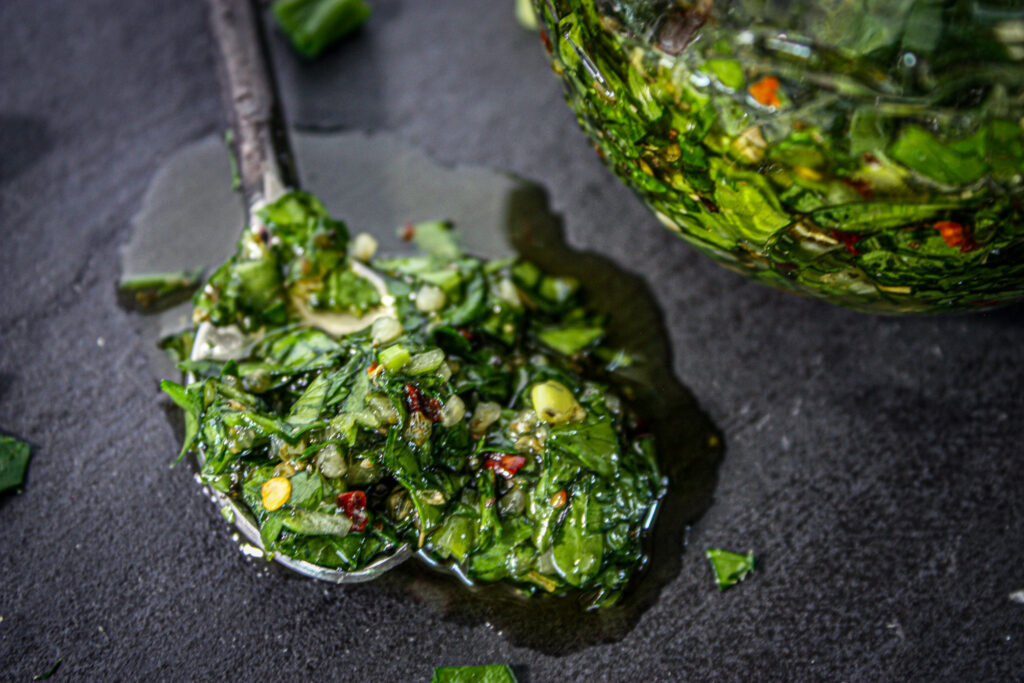
History of Chimichurri
The roots of traditional Argentinian chimichurri trace back to the 19th century. The most commonly accepted legend is that Irish immigrants created the condiment out of a longing for Worcestershire sauce. However, its exact origins are shrouded in folklore. However it originated, this delicious sauce is more of an infused olive oil and an Argentinian mainstay. Most commonly it’s used as a table condiment for grilled meat, steak, and empanadas.
There are many variations that exist in Uraguay, Paraguay, and Brazil as well. Now it’s very common in most of Latin America. Compared to its spicier Mexican Chimichurri cousin, Argentinian Chimichurri typically has the bright and zesty flavors of fresh parsley and cilantro. Olive oil and red wine vinegar are the primary ingredients as well as dried oregano, salt, pepper, garlic, and chili peppers. It’s a fantastic melding of flavors for a quick dip, sauce, or marinade.
While I made this for vegan and vegetarian dishes, you can certainly make this to accompany a meat dish like steak or chicken. It’s surprisingly healthy and has a lot of toxin-binding capabilities thanks to the parsley. The antioxidant and immune support properties are a great support to organ health.
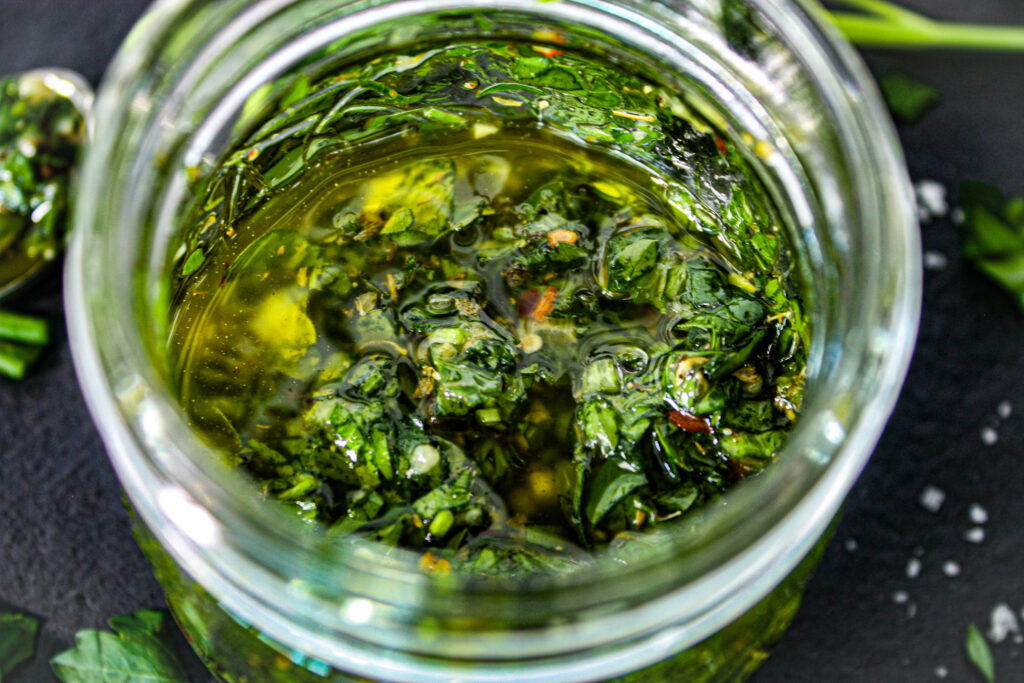
Fresh Chimichurri Ingredients
At the heart of chimichurri lies a simple yet powerful combination of fresh ingredients, each contributing to its distinct taste and aroma:
- Parsley: The backbone of chimichurri, fresh parsley provides a bright, herbaceous flavor that forms the base of the sauce. Italian flat-leaf parsley is often preferred for its robust taste and vibrant green color.
- Garlic: Aromatic garlic adds depth to chimichurri, infusing it with a rich, savory essence. Fresh garlic cloves are minced to release their potent flavor.
- Olive Oil: High-quality olive oil serves as the emulsifier in chimichurri. It binds the ingredients together while imparting a smooth texture and a light fruity bitterness and nutty undertones.
- Red Wine Vinegar: Tangy red wine vinegar lends a subtle acidity to chimichurri, balancing the flavors and enhancing its overall complexity. You can use other vinegar varieties, such as white wine vinegar or apple cider vinegar according to personal preference.
- Oregano: Dried oregano contributes earthy notes and a hint of bitterness to chimichurri, complementing the freshness of the parsley and garlic. While fresh oregano can be used, dried oregano is more commonly employed for its concentrated flavor.
- Red Pepper Flakes: For a touch of heat, red pepper flakes or chili peppers are often incorporated into chimichurri, providing a subtle kick without overwhelming the other flavors.
- Salt and Pepper: Essential seasonings such as salt and pepper are added to taste, enhancing the overall balance of flavors and elevating the complexity of the sauce.
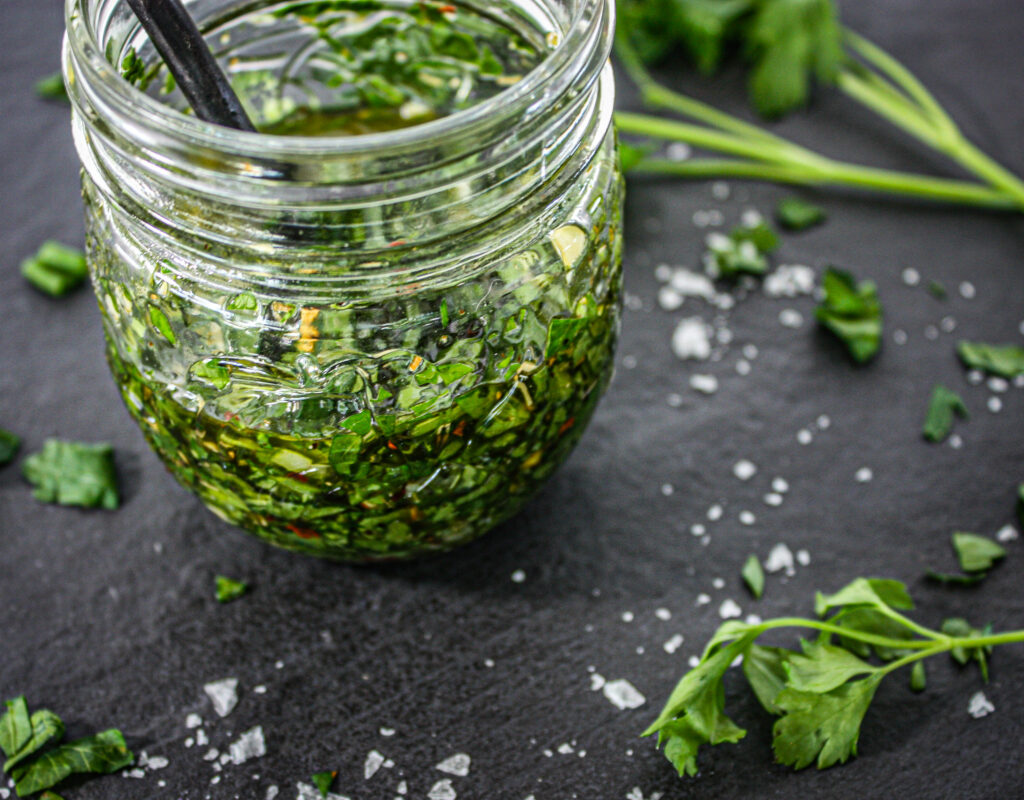
How to Use Chimichurri
Whether used as a marinade, condiment, or dipping sauce, chimichurri adds a layer of complexity that’s great on so many dishes:
- Grilled Veggies: Perhaps the most traditional pairing, chimichurri is delicious when served alongside grilled vegetables like cauliflower steaks and veggie kabobs.
- Tofu Marinade: Chimichurri also pairs exceptionally well with tofu adding a burst of freshness. Try it on a southwest-style tofu bowl with black beans, avocado, and quinoa, or even over rice and za’atar carrots.
- Pasta and Bread: Being so versatile, it’s the perfect base for a fresh pasta sauce. One of my other favorites is to use leftovers for dipping oil with fresh bread.
- Sandwiches and Wraps: Spread chimichurri onto sandwiches, wraps, or burgers for a burst of flavor. I love using it in a grilled cheese for a kick of flavor.
- Dressing: Chimichurri is awesome as a salad dressing, taco or burrito sauce, drizzled on grilled portobello mushrooms, or corn on the cob. Try it over smashed potatoes too, it’s amazing.
Storage
- Store fresh chimichurri in an airtight container in the fridge for 3-4 days.
- For longer storage, you can freeze it in an ice cube tray for up to three months. Transfer frozen cubes to a zip-close freezer bag. Defrost cubes of chimichurri in the fridge for several hours or overnight.
- I like to set it on the counter for a few minutes before I am going to use it. This allows the olive oil to come to room temp.
Try these other recipes:
Black Bean Quesabirria Tacos with Consume
If you tried this recipe, leave a comment below, and follow us for more recipes on Instagram, Pinterest, and Facebook.
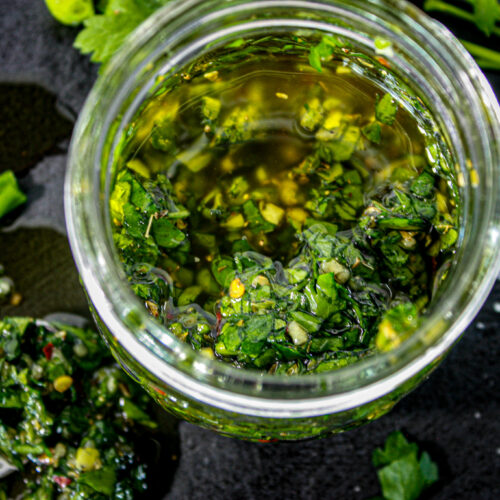
Fresh Chimichurri
Ingredients
- 1 cup parsley-chopped, stems removed
- 1 tbsp garlic minced
- 1/3 cup olive oil
- 2 tbsp red wine vinegar
- 1 tsp oregano-dried
- 1 tsp salt
- 1/2 tsp cracked pepper
- 1/2 tsp red pepper flakes (optional)
Instructions
- Finely chop the parsley leaves and garlic.
- Whisk all the ingredients together in a small container. Cover and let sit at room temperature for an hour before serving. Use as a spread, marinade, or sauce.
- Store in an airtight container in the fridge for up to 3-5 days.
- You can also blend this in a food processor or blender if you prefer a smoother consistency.

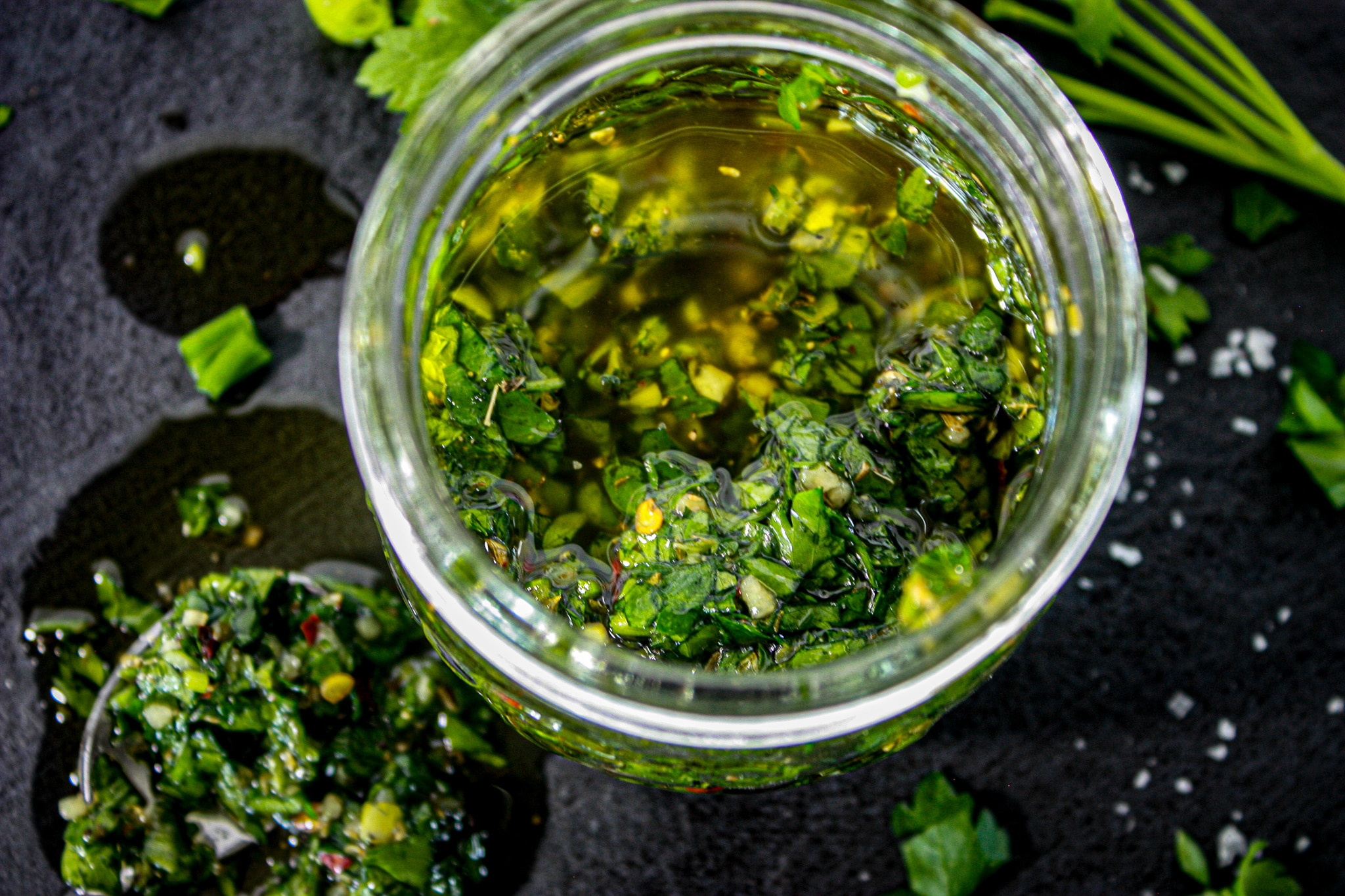
March 5, 2025 at 9:58 amebelnc
March 6, 2025 at 12:57 am5jkyyq
March 6, 2025 at 5:31 amaylccx